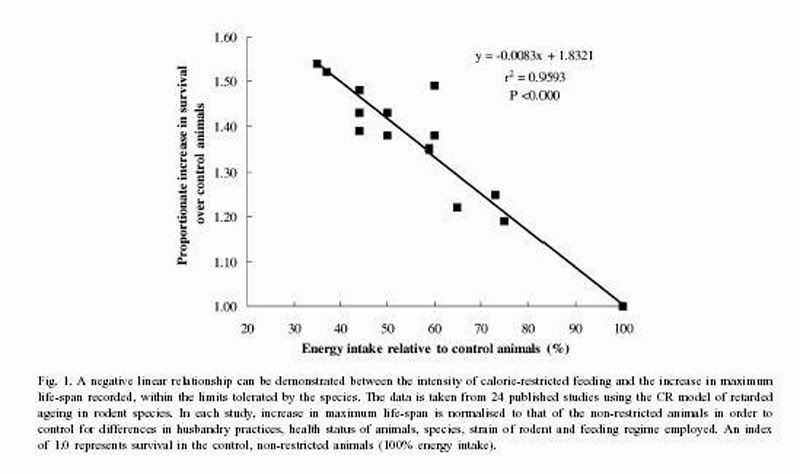All:
When you dig into the results, there's no real evidence for an anti-aging effect. However, it may improve various risk factors in people eg. with metabolic syndrome, and as in other fasting-based protocols, if you find it more convenient than straightforward reductions in energy intake, it's promising.
It would be very shocking for so many immune and cellular markers to reset after fasting, yet not have mean age of death go up. Even without affect maximum lifespan, increased health alone should push the age of death to the higher limit of what normal lifespan would allow? How could it be otherwise?
Well, look at the actual results:

Clearly, it not only could be otherwise — it was otherwise. Even the 25% survivorship was only increased 7.6%, to 31.1 mo (940 days). This is far from "push[ing] the age of death to the higher limit of what normal lifespan would allow". As to how such a thing could be: well, for starters, as I noted in my analysis, the superior health outcomes of the diet animals seems to have been exaggerated by relatively sickly and short-lived controls:
[In the survival curve] you see a ragged falloff of the control animals, and a somewhat squarer but still suboptimal survival curve in the intervention group. This isn't a sign of a good intervention: it's a sign of sickly controls. I alluded to this in my original post: "This actually means that their controls were somewhat short-lived, and even their FMD animals lived less long than normal, healthy, well-husbanded AL mice should have, albeit they did live longer than their controls." Those numbers correspond to 775 d mean and 1015 d maximum LS in controls, and 860 and 1049 d respectively in FMD, whereas (as I have hammered home repeatedly in my ≈18 y participation in online discussion forums about life extension) the numbers for normal, healthy, nonobese, non-genetically-messed-up, non-toxin-fed mice should be ≈900 and 1100 d, respectively.
But even if that artifact wasn't confounding the result, it wouldn't necessarily be surprising for an intervention to slow the rate of age-related loss of a selected set of health markers and still not affect maximum lifespan. Obvious possibilities would be that either (a) it's failing to hit a variety of other relevant aging processes, and/or (b) lifespan is being limited by some of the deleterious effects of the diet. I discussed the evidence for the latter in my earlier analysis too:
Normally, of course, that forces the question "so what's killing all these healthy mice?", but in this case we apparently know: at older ages, the animals don't tolerate the very fasting cycles that have given them much of their improved health, and it triggers their death. And note that in the FMD, even the "fasting" days still contained some energy, so this wasn't as severe a shock as a periodic water or juice fast. Indeed, it was a concern that just this kind of problem might be leading to false negatives in adult-onset CR studies that led Weindruch and Walford, in their seminal adult-onset studies of "regular daily CR," to institute CR gradually instead of all at once as is usually done without problem in juvenile mice (and to modify the diet to include a full regimen of micronutrients, protein, and essential fat at fewer Calories, instead of just feeding them half of the AL diet as had been successfully done with juveniles). Using such a protocol gave them the first clear-cut evidence that CR extends lifespan in early-adult mice — an effect later replicated in progressively older animals, including Spindler's study in "early-old" (50-60 mouse years) animals.
This might argue that even if some modified fasting regimen works well for you in mid-adulthood, you'd have to gradually shift into "regular daily CR" as you age to reap life extension benefits and avoid the metabolic shock of the super-low-Calorie periods. However, that, of course, remains to be proven -- in mice  .
.
So, in general, please read my posts before asking questions about them  .
.
What do you think is the primary mechanism of action for CR affecting aging?
I don't think there is a primary MoA: CR forces a very wide sweep of changes to adapt to chronic energy restriction, a subset of which collectively retard the aging process.
Michael, I am finding many other studies on various intermittent fasting regimens in rodents other than the ones you cite, and some of these show impressive life extension versus control groups. One of the ones I like most is in mice where they fast four consecutive days every two weeks, and this results in a 64 week life versus 47.9 of controls. Before you object that the fasted mice must have eaten fewer calories, one of the remarkable things about this study was the fasted mice had *more lean body mass* than the controls.
See:
"Influence of short-term repeated fasting on the longevity of female (NZB×NZW)F1 mice"
Hiroshi Sogawa, , Chiharu Kubo
Mechanisms of Ageing and Development
Volume 115, Issues 1–2, 17 May 2000, Pages 61–71
http://www.sciencedi...047637400001093
What do you think the defect in that study might be?
The thing to know about the mice in this study, which is not a "defect" but makes the results not extrapolable to otherwise-normal, healthy people's aging, is the fact that (NZB×NZW)F1 mice (inconsistently referred to as B/W mice) are not normal animals, but a strain of mice that suffers from a severe autoimmune disease similar to lupus and causing fatal glumerulosclerosis. They live extremely short lives as a result: in this study, av'g LS for control and fasted mice were 47.9 and 64.0 weeks (335.3 and 448 days), respectively; median survivorship was 46 and 67 weeks (322 and 469 d), respectively. They don't crunch out an experiment-specific "maximum LS," but you can see from tehir Fig. 5 that the last control and fasted mouse died at 65 and 90 weeks, respectively. Again, normal healthy mice that are raised competently live close to 900 d on average.
CR and IF have significant anti-inflammatory effects in general and profoundly retard the progression of glumerulosclerosis in these mice, so they live longer. This can't really be taken as informative about the anti-aging effect (or lack of it) in such a diet in normal, healthy humans or rodents. And as we've just seen, a similar protocol in a genetically normal strain of mouse did not extend maximum lifespan, and didn't even really do much for median LS compared to better-husbanded AL mice of the same species in other labs.
The authors speculate that the higher body weight in the fasted animals indicates that they probably took in more total energy, but food intake wasn't actually tracked, and my hypothesis would be that a significant am't of the effect would be because alleviating their severe autoimmunity and (in particular) slowing the progression of their severe renal disease would have enabled a more normal growth pattern.
Finally, although I would again emphasize that one shouldn't place too much weight on results in models of disease for healthy people not suffering from a similar pathology, it's worth noting that this extended fasting regimen "only" increased mean LS by ≈33%; in a previous report in the same strain of mice by the same scientists,(1) 40% CR doubled the LS of the mice on a high-fat chow, and tripled it on a high-sucrose-and-glycerol chow. So pish tosh yer fasting  .
.
Reference
1: Kubo C, Johnson BC, Gajjar A, Good RA. Crucial dietary factors in maximizing life span and longevity in autoimmune-prone mice. J Nutr. 1987 Jun;117(6):1129-35. PubMed PMID: 3598724.
Edited by Michael, 11 August 2016 - 07:35 PM.





















































